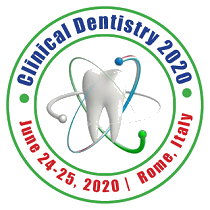Sarah Clyde
Glasgow Dental Hospital and School
Title: Green tooth discolouration as a result of biliary atrasia: A Case Report
Biography
Biography: Sarah Clyde
Abstract
Tooth discolouration is a problem that occurs in many children and adults, resulting in lower self confidence and often leading to patients actively seeking treatment in an attempt to improve their dental appearance. Discolouration of the dentition is multifactorial and can be extrinsic and intrinsic in nature. Extrinsic causes are due to the build up of stains from the external environment building upon the teeth while intrinsic causes affect the internal dental structures, causing discolouration from within via absorption of pigment. Intrinsic green discolouration as a result of infant biliary atrasia will be considered in this case report, along with treatment planning and subsequent management.
Patient MM attended Glasgow Dental Hospital when she was initialy six years old following a referral regarding ‘green staining of all their teeth’, which she was becoming aware of. The patient attended with her mum who had reported noticing green discolouration on the patients primary and permanent dentition. The patient was no experiencing pain or sensitivity
She was born at 36 weeks and suffered neonatal jaundice and was diagnosed with biliary atrasia. She had a successful live rtransplant when she was three. She was the youngest of three children, neither of whom had been diagnosed with this condition as neonates. Her medication lists consisted of Tacrolimus (immunosuppressant) , prednisolone (steroid) and mycophenolate mofetil (immunosuppressant).
This report looks at the patient’s dental appearance, treatment options carried out, including failed bell glass veneers and then proceeding to vital bleaching and reconsideration of veneer replacement.

